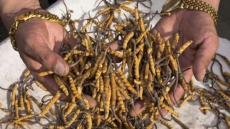TORONTO — It's a naturally occurring radioactive gas that can seep through cracks and crevices in houses and other enclosed spaces — and can cause lung cancer. Yet many Canadians aren't even aware of its existence or the health risk the substance can pose.
Radon, a colourless and odourless gas emitted through soil, is believed to be responsible for 16 per cent of lung cancer deaths in the country each year, making it the second-leading cause of lung cancer fatalities after tobacco use, says the Canadian Cancer Society. It's estimated that 3,000 Canadians die from lung cancer caused by radon annually.
Yet a national survey commissioned by the society found that only one in three respondents was aware of health issues concerning radon gas, while about the same proportion knew the radioactive gas could be "very harmful." About one-quarter of the 1,238 respondents had no idea it posed a health risk at all.
"Because it is a gas, it gets inhaled," said Gillian Bromfield, director of cancer control policy. "Once inhaled into the lungs, it can do damage."
Radon is released into the air as soil and rocks containing uranium gradually break down. Outdoors, released gas is quickly dispersed and levels are low. However, when radon enters buildings through foundations, joints and vents, it can accumulate in higher concentrations — particularly in basements, which are often poorly ventilated.
The risk of developing lung cancer depends on how much radon a person is exposed to, how long their exposure is, and whether they smoke. The risk of lung cancer due to radon gas is much higher among people who smoke than those who don't use tobacco, Bromfield said.
Despite the potential danger, the survey found 96 per cent of respondents had not tested their houses for radon, although half said they would move if the gas were detected in their homes.
Janet Whitehead, 60, had never smoked, so she was stunned to learn five years ago that the breathlessness and persistent cough she'd been experiencing were symptoms of lung cancer.
Whitehead and her husband had moved to Vancouver from Ontario, where the family had lived in Cornwall and Ottawa, so they "decided to explore it, to look further into what might have caused it," she said.
They sent radon test kits to the owners of their former homes.
"We felt it was the right thing to do, to send a kit to those homes just in case that's where I contracted the cancer," said Whitehead, who was treated with surgery.
While the Cornwall house tested negative for radon gas, the Ottawa home they'd lived in from 1993 to 1997 before moving to Vancouver had levels 16 times higher than Health Canada's guideline of 200 Bq/m3 (bequerels per cubic metre, a measure of radioactivity).
"The good news is that the home has now been successfully mitigated for radon and is completely safe for the current homeowner and family," she said.
Neither her husband nor children have developed lung cancer, likely because they did not spend as much time in the house as she did as a stay-at-home mother, Whitehead speculated.
To test for radon, homeowners can purchase a relatively inexpensive kit at a hardware store or hire a professional to measure radon levels, said Bromfield.
"The only way to really know is to check your own house. Your neighbour can have extremely low levels and you can have high levels."
If the indoor radon level exceeds 200 Bq/m3, the homeowner should hire a certified radon professional to determine the best and most cost-effective to rid their home of the gas, she said.
"We really just want Canadians to be aware that this risk exists. And this is something that we can actually do something about."
The online survey of 1,238 randomly selected Canadian adults was conducted Oct. 22-19 by Angus Reid. The survey has a margin of error of plus or minus 2.8 percentage points, 19 times out of 20.





